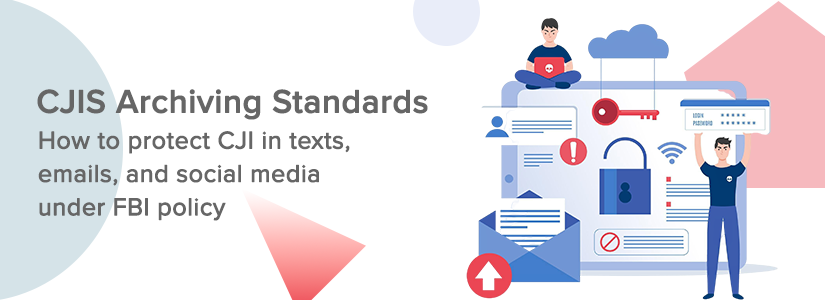Why Email, Text, and Social Media Archiving Must Be CJIS-Compliant

A modern guide for public sector IT leaders, law enforcement tech teams, and compliance officers
Who Needs to Care About CJIS-Compliant Archiving?
This isn’t just an IT issue—it’s an organizational responsibility. Whether you’re overseeing IT infrastructure, responding to public records requests, or managing digital communication tools, CJIS compliance affects your decisions. Each role listed is either directly responsible for handling CJI, ensuring secure systems, or ensuring communications meet public transparency and legal retention obligations. The following roles have a direct stake in CJIS compliance:
- City and county CIOs
- Police IT administrators
- Records managers and FOIA officers
- Legal/compliance departments
- Public information officers
- Any contractor or vendor handling criminal justice data
What Qualifies as Criminal Justice Information (CJI)?
Criminal Justice Information—or CJI—is a broad category defined by the FBI to include any data collected, transmitted, or stored in the process of conducting criminal justice activities. It’s not limited to arrest records or fingerprint data. If your agency sends details about a case, suspect, victim, or even internal analysis over email, text, or chat, it could fall under the CJI umbrella. And that means CJIS compliance applies. According to the FBI CJIS Security Policy, CJI includes:
- Arrest and booking details
- Biometric or fingerprint data
- Victim and witness information
- Case evidence or investigation notes
- Background check data
- Personally identifiable information (PII)
Whether that information appears in an official email or a casual text, CJIS rules still apply.
For a deeper dive: Read our CJIS Compliance Guide
Real-World Scenarios: When Communications Slip Through the Cracks
Hypothetical Case 1:
A sheriff’s deputy shares booking photos and witness statements with a prosecutor via SMS. When an internal review later requests those records, they’re gone—deleted when the officer switched phones.
→ No audit trail. No recovery. Non-compliant.
Hypothetical Case 2:
A court clerk responds to public inquiries about a criminal case via Facebook Messenger. Later, a FOIA request seeks all related communications. But no one archived those chats.
→ Incomplete disclosure = risk of legal exposure.
Why Communication Archiving Is Crucial for CJIS Compliance
Most agencies already secure their databases and internal apps. But communication tools—especially messaging and social media—are often left out.
Here’s why that’s a problem:
1. Legal Retention Obligations
FOIA, e-discovery, and state public records laws all require agencies to retain responsive communications. If messages aren’t archived, you may not be able to produce them when required.
2. CJIS Audits Are Expanding Scope
Modern CJIS audits often evaluate whether agencies capture and secure mobile communications and cloud-based messaging tools. A failure to log text messages or DMs can result in findings—or worse, decertification.
3. Deleted Doesn’t Mean Protected
Officers delete messages. Phones get reset. Social media accounts get shut down. Without proactive archiving, that data—and its audit trail—is lost permanently.
4. Transparency Builds Public Trust
Archived records allow agencies to respond confidently to internal investigations, public complaints, and media scrutiny. Without them, agencies look disorganized—or like they have something to hide.
What the CJIS Security Policy Requires for Messaging Platforms
Here are the key technical safeguards mandated by CJIS when handling CJI:
| Requirement | What It Means |
| FIPS 140-2 Encryption | All CJI must be encrypted in transit and at rest |
| Advanced Authentication | Multi-factor authentication (MFA) is required for remote access |
| Access Controls | Only authorized personnel can view or export CJI |
| Audit Logging | All access, edits, and exports must be recorded |
| Vendor Security Addendum | All third-party providers must sign and follow CJIS controls |
These apply to any tool used to transmit or store CJI—including messaging apps, email, and social media.
Related reading: Top 10 CJIS Compliance Requirements
Common Myths That Create Risk
“We tell staff not to use personal phones.”
Reality: Convenience usually wins. If usage isn’t monitored or captured, it doesn’t matter what the policy says.
“Our MDM protects us.”
Reality: Mobile Device Management secures the device—not the message. It won’t archive or log communications.
“We only use email.”
Reality: Most agencies use multiple channels—texts, chats, DMs. If they carry CJI, they must be archived.
“We’re not a police department.”
Reality: CJIS applies to any agency that stores, processes, or shares CJI—including courts, prosecutors, and even IT contractors.
What to Look for in a CJIS-Compliant Archiving Solution
The challenge isn’t just knowing what CJIS requires—it’s finding a solution that actually delivers. Many tools secure data but don’t archive it. Others archive, but don’t offer true encryption, audit logging, or role-based access controls. To be truly compliant (and audit-ready), your agency needs a solution built with CJIS from the ground up—not retrofitted later. Here’s what to prioritize:
- Coverage for email, SMS, iMessage, WhatsApp, and social media
- FIPS 140-2 encryption for data at rest and in transit
- Role-based access control and audit logs
- Fast search and FOIA-ready exports
- Vendor agreement with CJIS Security Addendum
Flexible deployment (on-prem, cloud, or hybrid)
How Intradyn Supports CJIS-Compliant Communication Archiving
Of course, understanding the requirements is only half the battle. The other half is finding a vendor who doesn’t just check the boxes—but understands the nuances of CJIS audits, public records laws, and the communication habits of real-world agency teams. That’s where Intradyn comes in. We’ve worked with municipal IT leaders, law enforcement agencies, and public sector organizations across the country to help them implement archiving strategies that are both practical and fully CJIS-compliant. Whether you’re managing email servers or mobile phones, our solution helps your agency:
- Archive all key platforms: Outlook, Gmail, SMS, iMessage, WhatsApp, Facebook, Twitter, Instagram
- Meet encryption and access control mandates
- Store immutable audit logs
- Respond quickly to FOIA and legal requests
- Choose your deployment: cloud, on-premise, or hybrid
Learn more: Social Media Archiving
Learn more: Text Message Archiving
Learn more: WhatsApp Archiving
Frequently Asked Questions
Q: Can CJIS-compliant data be stored in the cloud?
A: Yes—as long as the cloud provider signs a CJIS Security Addendum and meets the FBI’s security requirements.
Q: Does CJIS apply to texts between officers?
A: If those texts contain CJI (e.g., suspect details, booking info), then yes—they fall under CJIS.
Q: Is social media subject to CJIS archiving?
A: Yes, if it’s used for public communication involving criminal justice matters.
Q: How often do CJIS audits check messaging platforms?
A: Increasingly often. Auditors now ask about mobile, cloud, and third-party tools regularly.

